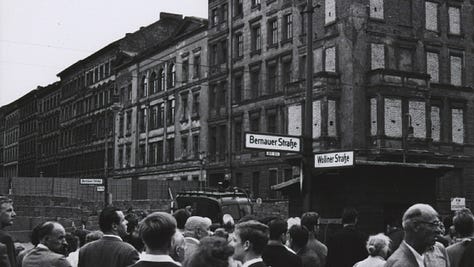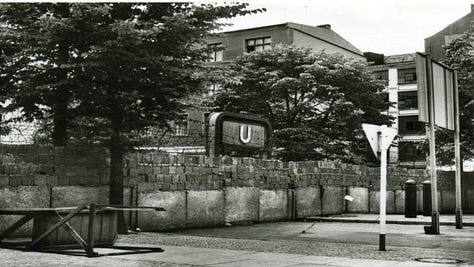In Part 1, Peter lands in a place that after all the years still isn’t making much sense to him. His local guide, Mona, takes him first to a Parliament session, then to an out-of-the-world café.
In Part 2, the café hurls Peter back in time, where eerie memories that feel like alien images start popping up. What is real, what is imagination? Is he hallucinating, and is he really back to his childhood in Berlin?
The taxi ride back to the Intercontinental — wordless, except for Mona’s quick exchanges with the driver.
She eyes me at times with something that looks like worry. But I know I’m a tough guy, I’ve been through worse.
Although – never fell down a rabbit hole before.
The wandering reporter, Mona called me.
I am the reporter, I am the story-teller, I am the walrus, goo-goo g'joob –
Enough.
This hotchpotch of languages, this wobbling jelly of reality gone rambling — had better back off.
I get out of the taxi. Take care, I hear Mona saying. See you tomorrow at breakfast.
I stop at the bar and get a bottle of Scotch. That should wake me up. Shake me up. I hop on the lift and get upstairs to my room.
I need a blanket, the bottle, and a chair. And set up camp on the balcony.
From the tenth floor the world looks eerie. Fog has come down again, milky with the diffuse city lighting. The Scotch is the only thing that feels real. It rolls down my throat and instantly warms my guts, my limbs.
It’s safe: I can let myself hang in this milkiness for a while, anchored by the bottle by my side.
The British film festival. How did it come into the picture? I hadn’t got the coffee when Mona told me about it. Or when I seem to believe Mona told me.
So the coffee is out of the guessing game. If it ever was. A bit far-fetched to suspect one’s being drugged in a café — for what purpose?
But then, the whole thing is not just far-fetched, but — out of this world — Mona’s words. When did it start?
When we sat down under the tree?
When we went inside?
During the Parliament speeches — swallowed up by a wormhole opened through the gibberish they were pouring out?
How far back?
At Heathrow, when they told me the destination didn’t exist?
Or far, far deeper back?
Berlin. I always thought I’ve never been there. Read and watched docs with a keen professional interest.
But, now I see, somehow I always stayed away from incoming Berlin stories. Never quite realising I did it on purpose.
Until today, when I said to Mona I was there in ’61. I was damals a Berliner, I said.
It was those pictures on the walls.
There were checkpoints before any border crossing. This side, the other side, the Russians, the Americans, the French. Sides wherever you looked. The July celebrations with burgers, and then with meringue or quiche Lorraine.
What a world it must have been, the two worlds — what, the many worlds — the island city under a blockade, cut off, but defiant with the vividness of a life brimming with choices.
The politics behind the spelling: Berlin (West), West-Berlin, Westberlin. To some, it was a different city. To others, a western half. A hyphen or a pair of brackets made a statement.
Which side were we on, I wonder? Elsa’s house. Erika’s house. We only needed to cross Bernauer Straße.
Do I come from the insular city that claimed its citizenship of the world? Or do I come from the city of defectors?
Or both. One and the same. Berlin, no hyphens.
Family Malchow took on a little four-year-old after he’d jumped from a house. The house was the Wall. The border, before the border became a wall.
When it all started, they used buildings to draw the line. Bricking doors up, nailing planks across windows. Splitting the U-Bahn line so that it ended with the wall.
The wall was first but a symbol behind a house, a factory wall, a wire fence, flanking a pavement. Bloß ein Schild. Just a sign. And craning street lamps to delete any shadows attempting to get across.

A border facing inwards.
The kid had somehow climbed on the roof and he jumped. Below him, the firefighters had stretched out a blanket and caught him. His parents collected him soon after. They were working on a cruise ship in the North Sea.
Bernauer Straße. That’s one of the landmarks, they say. House on the East, the pavement under its windows: the West.
You could try through the back courtyards. If you could cross the street, that is, and get past the sentinels. Once in, go through and come out in the yard. Head for the building at the back.
The narrow path between flowerbeds, past the hydrangeas, heading on to the back building. The cellar window stuck ajar, letting out whiffs of mould and rot. The squeaking door leading into the dark corridor, the letterboxes on the left. Straight ahead the main door letting out to Bernauer Straße.
I remember.



The door to Bernauer Straße — they were busy that day bricking it up. August. Soldiers. Brick on brick and scrape brick and scrape brick and scrape. Bread and butter and bread and butter.
The only way, up the stairs.
Or a mysterious apparition could open a vacated flat and let you in. From there you were on your own. But the helper had to never be known. Use the window and jump over.
But no. That day when they were bricking the door up. The splat of the brick landing then the scrape of the trowel spreading the cement. Going upstairs was the only way. Home to Tante Elsa.
What are the soldiers doing to our entrance door, Tante Erika? Are they locking us up inside? Did we do something wrong? How are we going to come over for Kaffee und Kuchen from across the street?
Tante Elsa must know.
The little four year old runs to the kitchen. Erika yells from far behind Peter halt, bleib stehen sofort, bleib stehen!
The kitchen window’s wide open. What’s going on outside. Splat and scrape and splat and scrape. Voices. Cars.
Lots of people heads out there. Then the street in full view. Photographers and people holding mikes just like they do on TV when something happened – in our Bernauer Straße?
I bend over the sill.
Below there’s Tante Elsa’s apron and her flannel dressing gown. Something inside not moving. Lying in a puddle. Sludge. Red and white and milky, jelly and —
Splat.
Erika pulls my arm and yanks me off.
The four year old stood on the roof.
The only way must have been up the stairs. Up and up and up. The splat and the scrape fainter and fainter.
Out there the sky above. Below a swarm of heads. Looking up. The apron and dressing gown had been scraped off. Gone. A white sheet hiding it. People holding it. Firefighters. Looking up like everyone else.
Up? Only the sky. Nothing else here. Only the boy.
Erika’s yells from below. They’re not letting her come up. They want answers. Heavy boots thudding up the stairs.
What are they doing to Tante Erika?
They won’t get me.
Gotta fetch Tante Elsa. The only way is down there.
I remember now.
Never seen Erika again. The Malchows were kind — with hindsight. I was just a kid who’d lost speech that day. The door had been bricked up for me. The hydrangeas — left in a flowerbed behind an impenetrable border.
I stood outside, free, but also cut off. Like the reporters taking down the story.
The speech returned at some point. When I went to school, maybe? But not the images.
My mother collected me soon afterwards. A boat crossing, then England.
Then my life.
Me. Peter Schild.
This is Peter Schild reporting. Me in the third person. The story that I tell myself, Mona said.
Unfailingly moving on from story to story, job to job, continent to continent, marriage to marriage. Showing and telling but never being there. Never going down the rabbit hole. Standing by and doing the show-and-tell, the reporter stance. Asking the questions, telling others what they need to know.
I’ve been standing in that street too long between borders, between walls. I found shelter with the insular crowd. The crowd that declared itself citizens of the world, denying their Heimat, if the Heimat cut them off.
So I did the same. I got myself a vivid life brimming with choices. No fabric in between.
But now I remember. I was coming from the other side. The side that people defected from.
Did I defect then too?
I kept standing in that street with cameras on watching things happening.
Never going in, down the dark corridors past the letterboxes and out again the other end into the back yards, looking up at the sky through the leaves, watching cats or squirrels blitzing off from underneath the hydrangeas.
I down my Scotch. The bottle? Still full. I’ll leave it here for housekeeping when they come in. I’m going packing.
Romania. Sharon will have to swallow it I’m afraid. Someone else can use my material and do the story. It just hasn’t really been about Romania this time, but about — I don’t know. Something else.
Me?
Went down the rabbit hole in Bucharest and came out in Berlin the other side.
The map is not the place, they say. Goodness knows what they mean, always thought. But this time, Romania – I might have tumbled down the pit the other way. From a place to what it stood for. My own, unknown to me even, map.
Will Mona be disappointed? Or she’ll put on that knowing smile of hers. That girl is just too young to play game master.
I have no time to check if I invented her, too, just like the British film festival. Like who knows what of the story I reported on Peter Schild over the years.
I have only just begun to see through.
I’ve booked myself on the next flight to Berlin. Open return.
Texted Kate to get the kids and come over, too. If she wants. Divorce or not.
It’ll be great to show them Berlin.
No. It’ll be great to just be there.
Inspired by true stories, both in Romania and in Berlin. The Malchows, by the way, did exist; they took on a 12-year-old who’d jumped like Peter Schild, before returning him, unlike Peter, to his parents on the East side.
Wondering about Berlin, the divided city and its individual tragedies? A good place to have a melancholy read is Die Bernauer Straße (stiftung-berliner-mauer.de) and Chronik der Mauer (chronik-der-mauer.de). There’s an English version.











Very rich…
Compelling!!